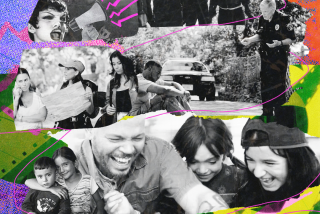L.A. Festival May Switch Plans in â93 : Arts: A reduced budget and criticism over its temporary nature have organizers considering changes in the event, focused on Africa, Middle East and African-American Diaspora.
What the 1993 Los Angeles Festival will look like, how long it will run and who it may include are still undecided matters, the stuff of committees and focus groups discussing the festivalâs âprocess.â But one thing is certain: Thereâs going to be a lot less money around for next yearâs event than thereâs been in the past.
With a general theme of Africa, the Middle East and the African-American Diaspora, the 1993 festivalâs budget will range from $3.5 million to $4.25 million, said Executive Director Allison Sampson. That is down from the $6 million artistic director Peter Sellars projected last December.
For the record:
12:00 a.m. July 31, 1992 For the Record
Los Angeles Times Friday July 31, 1992 Home Edition Calendar Part F Page 2 Column 4 Entertainment Desk 2 inches; 60 words Type of Material: Correction
Misquoted-- Allison Sampson, executive director of the Los Angeles Festival, was incorrectly quoted in Tuesdayâs Calendar in response to a question about financial support for the festival from foreign-owned businesses. Sampson said she was unsure of the number of African-owned businesses in Los Angeles, not the number of African-American-owned businesses. The 1993 festival will focus on Africa and the Middle East.
Having only this month retired its debt from the 1990 festival, an event that cost $5.6 million, Sampson said the festival is being realistic about raising money while the recession lingers. âThat was an â80s budget. This is a â90s budget. There are many causes that need attention in this city.â
Sampson said the festivalâs structure will be made public in September, when proposals from artists would also be solicited. Sellars, who is preparing to direct an opera at the Salzburg Festival, is expected to be back in Los Angeles by then.
The 1993 eventâs specifics are still ambiguous as organizers hammer out the overall concept with arts organizations, focus groups, the festivalâs steering committee and board of directors. Although the festival is only about a year away (scheduled for Aug. 17-Sept. 6, 1993), officials insist their planning is on schedule.
Organizers are considering lengthening the festival, extending it to one month or spreading activities out over a period as long as six months. This change would be in response to criticism that the eventâs temporary nature contributes little of lasting value to the cityâs arts environment.
The festival has received a $250,000 planning grant from the cityâs cultural affairs department and hopes to receive the same amount in the 1993-94 budget for production expenses. Last December, the Community Redevelopment Agency gave $500,000 for pre-production expenses for performances in targeted neighborhoods. AT&T; has donated more than $100,000 for performances about West Coast gospel and spiritual traditions.
Japanese-owned companies were big funders of the 1990 festival, donating $1 million. With the theme switching from the Pacific to the Middle East and Africa, Sampson said she is unsure if the festival will get the same corporate support. âI donât know how many companies here are African-American owned,â she said.
A reduced budget will likely translate into less programming, said Norman Frisch, an associate director of the festival. Less money may also mean more of a local focus, although Frisch said âthe festival has been heading that way for five years.â
Officials are mum about programming, but the National Endowment for the Arts has awarded $35,000 for a collaborative work by vocal group Sweet Honey in the Rock, the Dayton Contemporary Dance Company and choreographer Diane McIntyre. Although a contract has not been signed, festival officials have been talking with stage director Reza Abdoh about a contemporary adaptation of an ancient Persian poem.
Festival officials have been discussing the riotsâ effect on the city. However, they havenât changed their strategy in response to the events following the verdict in the Rodney G. King case.
âOur emphasis has always been on Los Angeles and the voices that have been ignored before,â Sampson said. âWe went to our coalitions and they said, âKeep doing what youâre doing.â . . . Our emphasis on youth culture has become even more important.â
Ben Caldwell, an African-American filmmaker who serves on the festivalâs steering committee, said, âThe riots were not that much of a surprise. Healing has always been a part of the festivalâs process. The riots show that we really do have to heal.â
But calling the festivalâs community outreach no more than âa cultural safari,â Keith Antar Mason, a performance artist and director of a collective called the Hittite Empire, said the festival hasnât sat down with black avant-garde artists who could âmotivate people to be involved.â
âItâs a totally knee-jerk reaction to the times,â Mason said. âThe black community needs to get exposed. Weâre going to get a gospel concert, a jazz concert and dancers from Guinea.â
Such controversy isnât new to the festival, which went through a lengthy process analyzing its 1990 effort.
âThereâs been constant tension around the festival,â Frisch said. âIs it friend or foe? People canât decide if weâre the best thing that ever happened to them or the worst thing.â
More to Read
The biggest entertainment stories
Get our big stories about Hollywood, film, television, music, arts, culture and more right in your inbox as soon as they publish.
You may occasionally receive promotional content from the Los Angeles Times.










